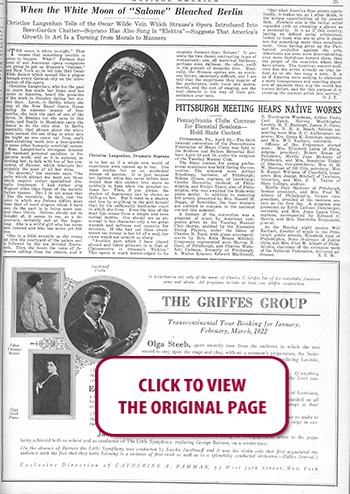 100 YEARS AGO IN MUSICAL AMERICA (391)
100 YEARS AGO IN MUSICAL AMERICA (391)
May 7, 1921
Page 25
When the White Moon of “Salome” Bleached Berlin
Christine Langenhan Tells of the Oscar Wilde Vein Which Strauss’s Opera Introduced Into Beer-Garden Chatter—Soprano Has Also Sung in “Elektra”—Suggests That America’s Growth in Art Is a Turning from Morals to Manners
"THE moon is white to-night.” That means that something terrible is going to happen. What? Perhaps that some of our American opera companies are going to put on Strauss’s “Salomé,” and New York so be led into that Oscar Wilde dialect which spread like a plague through every German city on the introduction of the opera.
Christine Langenhan, who for the past in six years has made her home and her career in America, heard the première of the work in Dresden during her student days. Later, in Berlin, where she sang at the New Royal Opera House during its summer season of four months, she took the part of one of the slaves. In Breslau too she sang in this opera, and finally in Hamburg came the chance to do the title rôle. In Berlin especially, that phrase about the white moon seemed the one thing to utter into the night as one came out from one’s heart-straining work into a beer-garden or some other humanly convivial corner.
Mme. Langenhan’s strongest interest and warmest personal ambition is for operatic work, and so it is natural, in meeting her, to talk with her of her conception of Salome, which interests her probably the most of all her rôles.
“In general,” the soprano says, “the parts which attract me most are those which require rather specialized dramatic treatment. I had rather sing Wagner rôles than those of the melodic Italian operas. But I do not mean that I like the eccentric. In fact, just the point in which my Salomé differs most from that of most singers whom I have seen do the part is in being more natural than theirs. Salomé should not be thought of, it seems to me, as a degenerate, certainly not at the beginning. She is a wilful girl who has never been crossed and who has never yet felt love.
“She is a little ennuyée as she comes out into the courtyard of the palace and is followed by the too devoted Narraboth. Then she hears the voice of Jokanaan calling from the cistern, and it is to her as if a whole new world of experience were opened up to her. One must realize her as an unchecked stream of passion. It is just because her lightest whim has never before been denied that this sudden love sours as suddenly to hate when the prophet refuses her. Then, if you please, the shadow of degeneracy can be shown as falling on her. But it must be a shadow cast less by anything in the girl herself than by the sufficiently loathsome court in which she lives. Even the kiss of the dead lips comes from a simple and even normal motive. One should see as abnormal in her character only a too great warmth and softness and capacity for devotion. If she had not these sweetnesses too strong in her bit of a soul, her claws would not scratch so sharp.
“Another part which I have played abroad and taken pleasure in is that of Clytemnestra in Strauss’s ‘Elektra.’ This opera is much keener-edged in its neurotic ferment than ‘Salomé.’ It presents the two classic contrasting types of womanhood; one, all maternal fondness, perhaps even dullness; the other, swift in the pursuit of romantic love. Musically, the Strauss operas are, as everyone knows, immensely difficult, and I am told that the expertness they require of the performers, both, vocal and instrumental, and the cost of staging, are the real obstacle in the way of their presentation over here.
“But what America thus misses operatically, it makes up, as I often think, in the unique opportunities of its concert field. Nowhere else is the recital artist regarded with so sweeping a glance as a personality. It is as if this country, having no defined social aristocracy, looked to those who are to give it pleasure for something more than entertainment. Once having given up the Puritanical prejudice against the arts, Americans are even more discriminating, even more fastidious toward them, than the people of the countries where they have arisen. The American concert audience has the artist already on trial before he or she has sung a note. It is as if America were seeking to elaborate a more homogeneous and exacting standard of manners than any the world has known before, and for this purpose it is pressing the musical artist into service.” —D.J.T.




 RENT A PHOTO
RENT A PHOTO





